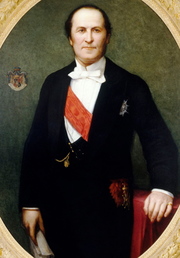|
Home
|
Apr 29, 2019
This week’s themePeople who became verbs This week’s words haussmannize MacGyver pasteurize disneyfy macadamize 
Georges-Eugène Haussmann
Art: Henri Lehmann, 1860 Last week’s theme Eponyms A.Word.A.Day
with Anu GargDuring a recent town hall meeting, Massachusetts senator and presidential candidate Elizabeth Warren was asked about getting Hillaried in the election. A person turning into verbs happens all the time. That’s how we got the word boycott into the language. That’s how we had the word lynch added into the dictionary. (Places become verbs too.) Will Warren get Hillaried? We hope not. Will the verb “to Hillary” become a part of the language? Remains to be seen. Meanwhile, this week we’ll feature five people, real or fictional, who have become verbs in the English language and entered the dictionary. Haussmannize
PRONUNCIATION:
MEANING:
verb tr.: To redevelop or rebuild an area, especially on a massive scale.
ETYMOLOGY:
Coined after Georges-Eugène Haussman (1809-1891) who was appointed by
Napoleon III to carry out the renovation of Paris. Earliest documented
use: 1865.
NOTES:
Haussmann carried out a massive overhaul of Paris that involved
demolishing whole neighborhoods. The new Paris had, among other things,
widened, tree-lined boulevards, new parks, fountains, sewers, aqueducts,
and more. His renovation of Paris inspired other cities around the world
to carry out similar overhauls. Haussmann was forced out as opposition
to him swelled, due to huge disruption of life (some 20,000 buildings
were destroyed) and cost overruns.
USAGE:
“In addition to monumentalizing himself, [Juan] Balaguer also aimed to
Haussmannize the traditional hearths of urban resistance. His principal
target was the huge low-income upper town area of Sabana Perdida,
northeast of the city center.” Mike Davis; Planet of Slums; Verso; 2007. A THOUGHT FOR TODAY:
This world is divided roughly into three kinds of nations: those that spend
lots of money to keep their weight down; those whose people eat to live;
and those whose people don't know where their next meal is coming from.
-David S. Landes, author, professor of economics and history (29 Apr
1924-2013)
|
|
Subscriber Services
Awards | Stats | Links | Privacy Policy
Contribute | Advertise
Awards | Stats | Links | Privacy Policy
Contribute | Advertise
© 1994-2025 Wordsmith